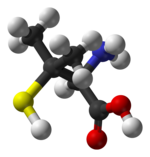青黴胺
此條目的引用需要清理,使其符合格式。 (2021年10月18日) |
 | |
 | |
| 臨床資料 | |
|---|---|
| 商品名 | Cuprimine, Cuprenyl, Depen |
| 其他名稱 | D-penicillamine |
| AHFS/Drugs.com | Monograph |
| MedlinePlus | a618021 |
| 核准狀況 | |
| 懷孕分級 |
|
| 給藥途徑 | By mouth (capsules) |
| ATC碼 | |
| 法律規範狀態 | |
| 法律規範 |
|
| 藥物動力學數據 | |
| 生物利用度 | Variable |
| 藥物代謝 | Liver |
| 生物半衰期 | 1小時 |
| 排泄途徑 | Kidney |
| 識別資訊 | |
| |
| CAS號 | 52-67-5 |
| PubChem CID | |
| IUPHAR/BPS | |
| DrugBank | |
| ChemSpider | |
| UNII | |
| KEGG | |
| ChEBI | |
| ChEMBL | |
| CompTox Dashboard (EPA) | |
| ECHA InfoCard | 100.000.136 |
| 化學資訊 | |
| 化學式 | C5H11NO2S |
| 摩爾質量 | 149.21 g·mol−1 |
| 3D模型(JSmol) | |
| |
| |
青黴胺,以Cuprimine品牌銷售,是一種主要用於治療威爾遜氏病的口服藥物[1] [2],還用於患有尿胱氨酸水平高、類風濕性關節炎以及各種重金屬中毒的腎結石患者[1][2]。
醫療用途
[編輯]美國 1970 年批准青黴胺用於醫療用途,並且在世界衛生組織的基本藥物清單上[1] [3]。
青黴胺可以用作螯合劑於:
在胱氨酸尿症(一種遺傳性疾病,其中高尿胱氨酸水平導致胱氨酸結石形成)中,青黴胺可以與半胱氨酸結合產生比胱氨酸更易溶解的混合二硫化物。[7]
對常規療法的充分試驗沒有反應的嚴重活動性類風濕性關節炎患者,青黴胺可用作緩解疾病的抗風濕藥(DMARD) 進行治療 [9]。儘管由於 TNF 抑制劑、托珠單抗和托法替尼的使用,青黴胺如今已經較少使用。青黴胺通過減少T淋巴細胞數量、抑制巨噬細胞功能、減少IL-1 、減少類風濕因子和防止膠原交聯來起作用。
不利影響
[編輯]骨髓抑制、味覺障礙、厭食、嘔吐和腹瀉是最常見的副作用,約 20-30% 接受青黴胺治療的患者會產生, 青黴胺常見的副作用還包括皮疹以及白細胞減少。[10][11][1]其他嚴重的副作用包括肝病、閉塞性細支氣管炎和重症肌無力,[1]並且不建議紅斑狼瘡患者使用青黴胺, [2]懷孕期間使用也可能會對嬰兒造成傷害[2]。
其他可能的不良反應包括:
- 腎病[7][11]
- 肝毒性[12]
- 膜性腎小球腎炎[13]
- 再生不良性貧血(特異質性) [12]
- 抗體介導的重症肌無力[11]和藍伯-伊頓肌無力綜合症,即使停藥後仍可能持續存在
- 藥物性系統性紅斑狼瘡[14]
- 匐行性穿孔性彈性組織變性[15]
- 中毒性肌病[16]
- 乳房脹大[17]
- 少精症
化學結構
[編輯]青黴胺是一種三官能有機化合物,由硫醇、胺和羧酸組成,結構上類似於 α-氨基酸半胱氨酸,但在硫醇上有孿生二甲基取代基。像大多數氨基酸一樣,是一種無色固體,在生理pH值下以兩性離子的形式存在。
青黴胺是一種手性藥物,具有一個立體中心,以一對對映異構體的形式存在,如圖所示。 (S)對映異構體,具有抗關節炎作用,L-青黴胺(R絕對構型)是有毒的,因為它會抑制吡哆醇(即維生素B6 )起作用。[18] [19]該對映異構體是青黴素的代謝物,但本身沒有抗生素特性。 [20]多種青黴胺-銅複合結構已知。 [21]
歷史
[編輯]John Walshe於1956年首次描述了青黴胺在威爾遜病中的使用。 [22]他在服用青黴素的患者(包括他自己)的尿液中發現了這種化合物,並通過實驗證實它通過螯合作用增加了尿銅的排泄。他最初難以說服當時的幾位世界專家(丹尼·布朗和卡明斯),因為其他人認為威爾遜病的主要問題不在於銅穩態,而是氨基酸代謝問題,並且應該使用二巰基丙醇作為螯合劑。後來經研究證實了以銅-中心理論和D-青黴胺的功效。 Walshe 還率先在 Wilson 開創了其他的螯合劑如三亞乙基四胺和四硫代鉬酸鹽。 [23]
青黴胺首先由約翰·康福斯在羅伯特·羅賓遜的監督下合成。 [24]
1964 年出現第一個成功案例以來,青黴胺一直用於治療類風濕性關節炎。 [25]
成本
[編輯]在美國,Valeant在2016年將藥物成本從每月約500美元提高到24,000美元。 [26]
參考文獻
[編輯]- ^ 1.0 1.1 1.2 1.3 1.4 Penicillamine. The American Society of Health-System Pharmacists. [8 December 2016]. (原始內容存檔於21 December 2016).
- ^ 2.0 2.1 2.2 2.3 WHO Model Formulary 2008. 2009: 64, 592. ISBN 9789241547659.World Health Organization (2009). Stuart MC, Kouimtzi M, Hill SR (eds.). WHO Model Formulary 2008. pp. 64, 592. hdl:10665/44053. ISBN 9789241547659.
- ^ World Health Organization model list of essential medicines: 21st list 2019. Geneva. 2019. WHO/MVP/EMP/IAU/2019.06. License: CC BY-NC-SA 3.0 IGO.
- ^ Peisach, J.; Blumberg, W. E. A mechanism for the action of penicillamine in the treatment of Wilson's disease. Molecular Pharmacology. 1969, 5 (2): 200–209. PMID 4306792.
- ^ Peterson, R. G.; Rumack, B. H. D-Penicillamine therapy of acute arsenic poisoning. The Journal of Pediatrics. 1977, 91 (4): 661–666. PMID 908992. doi:10.1016/S0022-3476(77)80528-3.
- ^ Hall, A. H. Chronic arsenic poisoning. Toxicology Letters. 2002, 128 (1–3): 69–72. PMID 11869818. doi:10.1016/S0378-4274(01)00534-3.
- ^ 7.0 7.1 Rosenberg, L. E.; Hayslett, J. P. Nephrotoxic Effects of Penicillamine in Cystinuria. JAMA: The Journal of the American Medical Association. 1967, 201 (9): 698–9. PMID 6071831. doi:10.1001/jama.1967.03130090062021.Rosenberg, L. E.; Hayslett, J. P. (1967). "Nephrotoxic Effects of Penicillamine in Cystinuria". JAMA: The Journal of the American Medical Association. 201 (9): 698–9. doi:10.1001/jama.1967.03130090062021. PMID 6071831.
- ^ Steen, V. D.; Medsger Jr, T. A.; Rodnan, G. P. D-Penicillamine therapy in progressive systemic sclerosis (scleroderma): A retrospective analysis. Annals of Internal Medicine. 1982, 97 (5): 652–659. PMID 7137731. doi:10.7326/0003-4819-97-5-652.
- ^ Cuprimine (penicillamine) Capsules for Oral Use. U.S. Full Prescribing Information (PDF). [29 April 2016]. (原始內容 (PDF)存檔於8 September 2015).
- ^ Grasedyck, K. D-Penicillamine—side effects, pathogenesis and decreasing the risks. Zeitschrift für Rheumatologie. 1988,. 47 Suppl 1: 17–19. PMID 3063003.
- ^ 11.0 11.1 11.2 Camp, A. V. Penicillamine in the treatment of rheumatoid arthritis. Proceedings of the Royal Society of Medicine. 1977, 70 (2): 67–69. PMC 1542978
 . PMID 859814. doi:10.1177/003591577707000201.Camp, A. V. (1977). "Penicillamine in the treatment of rheumatoid arthritis". Proceedings of the Royal Society of Medicine. 70 (2): 67–69. doi:10.1177/003591577707000201. PMC 1542978. PMID 859814.
. PMID 859814. doi:10.1177/003591577707000201.Camp, A. V. (1977). "Penicillamine in the treatment of rheumatoid arthritis". Proceedings of the Royal Society of Medicine. 70 (2): 67–69. doi:10.1177/003591577707000201. PMC 1542978. PMID 859814.
- ^ 12.0 12.1 Fishel, B.; Tishler, M.; Caspi, D.; Yaron, M. Fatal aplastic anaemia and liver toxicity caused by D-penicillamine treatment of rheumatoid arthritis. Annals of the Rheumatic Diseases. 1989, 48 (7): 609–610. PMC 1003826
 . PMID 2774703. doi:10.1136/ard.48.7.609.
. PMID 2774703. doi:10.1136/ard.48.7.609.
- ^ Mitchell, Richard Sheppard; Kumar, Vinay; Abbas, Abul K.; Fausto, Nelson. Robbins Basic Pathology 8th. Philadelphia: Saunders. 2007. ISBN 978-1-4160-2973-1.
- ^ Chalmers, A.; Thompson, D.; Stein, H. E.; Reid, G.; Patterson, A. C. Systemic lupus erythematosus during penicillamine therapy for rheumatoid arthritis. Annals of Internal Medicine. 1982, 97 (5): 659–663. PMID 6958210. doi:10.7326/0003-4819-97-5-659.
- ^ Bolognia, Jean; et al. Dermatology. Philadelphia: Elsevier. 2007. ISBN 978-1-4160-2999-1.2nd edition.
- ^ Underwood, J. C. E. General and Systemic Pathology. Elsevier Limited. 2009. ISBN 978-0-443-06889-8.
- ^ Taylor; Cumming; Corenblum. Successful treatment of D-penicillamine-induced breast gigantism with danazol. Br Med J. January 31, 1981, 282 (6261): 362–3. PMC 1504185
 . PMID 6780026. doi:10.1136/bmj.282.6261.362-a.
. PMID 6780026. doi:10.1136/bmj.282.6261.362-a.
- ^ Ariens, E.J. Chiral Separations by HPLC. Chichester: Ellis Horwwod, Chichester. 1989: 31–68.
- ^ Aronson, J. K. Meyler's Side Effects of Analgesics and Anti-inflammatory Drugs. Amsterdam: Elsevier Science. 2010: 613. ISBN 9780080932941. (原始內容存檔於2017-09-10).
- ^ Parker, C. W.; Shapiro, J.; Kern, M.; Eisen, H. N. Hypersensitivity to penicillenic acid derivatives in human beings with penicillin allergy. The Journal of Experimental Medicine. 1962, 115 (4): 821–838. PMC 2137514
 . PMID 14483916. doi:10.1084/jem.115.4.821.
. PMID 14483916. doi:10.1084/jem.115.4.821.
- ^ Birker, Paul J. M. W. L.; Freeman, Hans C. Structure, properties, and function of a copper(I)–copper(II) complex of D-penicillamine: pentathallium(I) μ8-chloro-dodeca(D-penicillaminato)octacuprate(I)hexacuprate(II) n-hydrate. J. Am. Chem. Soc. 1977, 99 (21): 6890–6899. PMID 903530. doi:10.1021/ja00463a019.
- ^ Walshe, J. M. Wilson's disease; new oral therapy. Lancet. Jan 1956, 270 (6906): 25–6. PMID 13279157. doi:10.1016/S0140-6736(56)91859-1.
- ^ Walshe, J. M. The Story of Penicillamine: a Difficult Birth. Mov. Disord. Aug 2003, 18 (8): 853–9. PMID 12889074. doi:10.1002/mds.10458.
- ^ Oakes, Elizabeth H. Encyclopedia of World Scientists. Infobase Publishing. 2007: 156 [2021-10-18]. ISBN 9781438118826. (原始內容存檔於2021-10-18).
- ^ Jaffe, I. A. Rheumatoid Arthritis with Arteritis; Report of a Case Treated with Penicillamine. Annals of Internal Medicine. 1964, 61: 556–563. PMID 14218939. doi:10.7326/0003-4819-61-3-556.
- ^ Petersen, Melody. How 4 drug companies rapidly raised prices on life-saving drugs. Los Angeles Times. [27 March 2019]. (原始內容存檔於2019-03-27).
外部連結
[編輯]- Penicillamine. Drug Information Portal. U.S. National Library of Medicine. [2021-10-18]. (原始內容存檔於2019-12-05).


